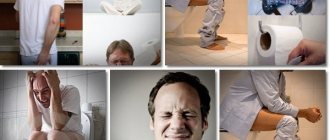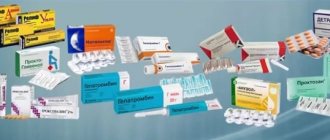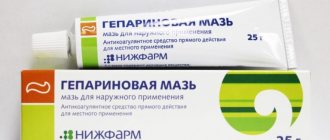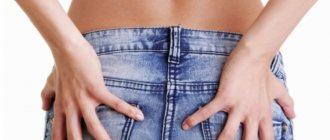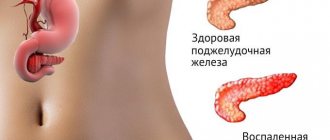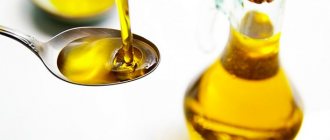Hemorrhoids classification
Hemorrhoids exist in two forms, manifest themselves with different symptoms and occupy one of the first places in the diseases of the intestinal tract:
Acute hemorrhoids - severe pain occurs, thrombosis of internal and external nodes occurs. All symptoms of the disease are pronounced. The resulting thrombosis is divided into three stages:
- Pain upon examination, the nodes change color from dark red to bluish.
- Spread of inflammation - neighboring tissues are involved in the process.
- Necrosis - dead nodes in hemorrhoids become black.
Chronic hemorrhoids are also inflammation of the hemorrhoids. The pain syndrome is slightly expressed. Symptoms can generally be missed without paying attention to them. Divided into four stages:
- Mild discomfort and symptoms of inflammation can only be determined during an internal examination.
- Inflamed nodes may fall out, but you can straighten them yourself.
- The loss of nodes is becoming more frequent; to eliminate the problem, the help of a doctor is necessary.
- Inability to reposition nodes.
But aggravated hemorrhoids are replete with symptoms of varying severity. To be able to stop them, you need to know the causes and tactics of how to save yourself from exacerbation of hemorrhoids.
Path of development of the disease
Hemorrhoids are a common disease and can be successfully treated at any stage, of which there are four:
- The initial stage manifests itself with burning and itching in the anus, unpleasant sensations that do not cause much concern. Timely treatment can completely eliminate the disease, but rarely does anyone consult a doctor at this moment.
- The second degree of hemorrhoids is accompanied by constipation, blood appears after each act of defecation. Hard feces injure the walls of the rectum, forming bleeding cracks. Hemorrhoidal nodes are clearly felt. When straining, they fall out. Then they straighten themselves out. Treatment must be carried out comprehensively. This is the use of suppositories, ointments, nutritional correction and exercise.
- Third degree of illness . Previously appeared symptoms develop and intensify. Enlarging nodes on the veins fall out at the slightest tension and can only be set manually. When they are pinched, unbearable pain occurs. Inflammation and even thrombosis may occur. The inflammatory process in the perineum and anus can cause fever, fever and malaise. This should alert the patient. Treatment started at the third stage will be long, but it will still be possible to do without surgery. The patient will have to give up alcohol, eliminate unhealthy foods and do exercises.
- The fourth stage occurs with previous ineffective treatment. The nodes become so large that they are constantly on the outside. Every movement causes pain, the itching in the anus does not subside. Heavy bleeding can lead to anemia. The cones become pinched and become inflamed. At this stage, surgical treatment is necessary.
Exacerbation of hemorrhoids can be caused by hypothermia, alcohol, and excessive physical stress.
Causes and duration of exacerbation of hemorrhoids
Exacerbation of hemorrhoids depends on a variety of reasons. Quite often, a person simply loses sight of what aggravates hemorrhoids, does not pay attention, leading the disease to unpleasant consequences. Why hemorrhoids worsen and the reasons for hemorrhoids worsening are given below:
- Physical stress – in case of low motor activity, blood stagnation develops in the pelvis. Sooner or later, this stagnation leads to an aggravation of the process. Conversely, excessive physical activity leads to increased blood flow to the pelvis and rectum. In this case, the outflow of blood is much less than the duct, which is why stagnation occurs with the development of exacerbation of hemorrhoids.
- Food has an indirect effect on the exacerbation of hemorrhoids. Constipation that occurs due to poor nutrition provokes exacerbations. This occurs with constant mechanical irritation of the rectum by solid feces. The same applies to other diseases of the digestive tract, for example, those accompanied by diarrhea. In this case, frequent irritation of the rectal mucosa leads to minor hemorrhages and inflammation in the walls of blood vessels, which causes an exacerbation of the process.
- Alcohol is highlighted in a separate line - its constant use inevitably leads to the appearance of congestion in the hemorrhoidal veins.
- Pregnancy - the gradual growth of the uterus begins to put pressure on the blood vessels of the small pelvis; for a long time they are in a compressed state, which leads to a deterioration in blood flow and the occurrence of stagnation.
- Nervous state - it is known that stomach ulcers in 35% of cases occur against the background of severe stress. The same can be said about hemorrhoids. Hemorrhoids are one of the diseases of the digestive tract that develops very quickly and makes itself felt during prolonged, excessive nervous overload. One of the most long-lasting and unpredictable forms of aggravated hemorrhoids is a process that arose due to nervousness.
- Menstrual cycle - exacerbation in this process occurs less frequently, but can also occur with increased blood flow during menstruation.
- The appearance of rectal neoplasms, both benign and malignant. In these cases, hemorrhoids can worsen suddenly.
- Heredity
Causes of exacerbation
The exact cause of the expansion of the hemorrhoidal plexus has not been sufficiently studied. There is a lot of conflicting information about the causes that contribute to the development of hemorrhoids. The most common causes of the disease are considered to be poor diet, disruption of the bowel movement, family history and increased pressure in the abdominal cavity.
Many scientists suggest that defecation disorders play an important role in the development of hemorrhoidal disease. Too much tension in the abdominal muscles during bowel movements increases the load on the hemorrhoidal plexus.
Several studies have found a clear link between chronic constipation and hemorrhoids. Constipation, in turn, leads to false defecation behavior. However, other authors doubt that constipation contributes to hemorrhoidal disease.
An unhealthy diet with insufficient fiber also contributes to the development of the disease. The prerequisite for the development of this theory was an epidemiological study in 1977, which found that Africans eat foods high in fiber and suffer from gastrointestinal diseases less often than Europeans and Americans. In fact, hemorrhoids are extremely rare in rural Africa.
Some studies show the positive effects of fiber on bowel function. However, some authors question the importance of a high-fiber diet, since it leads to increased stool volume, which in turn causes more frequent bowel movements.
A 2011 study found a correlation between body mass index (BMI) and the incidence of hemorrhoids. The average BMI was 27.04 for patients with this disease. A relatively small relationship was found, but still statistically significant. In this study, BMI was the only independent risk factor for developing the disease, while gender, education, marital status, pregnancy and childbirth had no effect.
Important! According to this study, age was also a significant risk factor.
Obesity
A French study found that a crash diet, chronic constipation, increased alcohol consumption and abdominal exercise tripled the risk of developing hemorrhoids. However, being overweight was not considered a risk factor in this study.
Mental stress has been found to protect against hemorrhoids.
Clinical picture of exacerbation of hemorrhoids
Very often a person does not even realize that he has hemorrhoids. The flow can proceed absolutely without any manifestations. Signs of the presence of the disease often make themselves known during the period of exacerbation, which is characterized by the following symptoms:
- Strong pain
- Appearance of blood
- Swelling of the node and tissues around it
- Pain when sitting
- Hyperthermia
- Impossibility of reduction (not always)
As a rule, exacerbation rarely goes away on its own. It is imperative to seek medical help to avoid complications of the disease, and also to know in the future what to do if hemorrhoids worsen and how to prevent the process from worsening.
Exacerbation of hemorrhoids: complications
The rate of development of complications depends on the severity of the disease. If there are any warning signs or symptoms, the patient should immediately consult a doctor, as the following may occur:
- Acute thrombosis – develops when hemorrhoids prolapse and sphincter spasm. More often appears with external hemorrhoids.
- Anemia – appears with frequent, severe bleeding. The person begins to feel weakness, sweating, and increased heart rate. Internal organs experience hypoxia.
- Incarceration - this process in hemorrhoids often causes necrosis. A very painful process. The prolapsed node becomes impossible to set due to spasm of the anal sphincter and swelling of the anus.
- Anal fissures – occurs with frequent constipation. With constant straining during defecation, constant tension leads to swelling of the mucous membrane and, over time, its rupture and the addition of a secondary infection.
- Colitis - appears when the walls of the large intestine are inflamed. Accompanied by painful spasms and flatulence.
- Paraproctitis is the appearance of an abscess due to purulent inflammation of the space in the peri-rectal area. Swelling and redness appear, a fistula forms, and there may be purulent discharge.
Treatment
Treatment of this disease can be started at any stage and as early as possible. First of all, you should think about your diet. Doctors strongly recommend limiting alcohol consumption, and you should also exclude fried and fatty foods from your diet. According to doctors, at the initial stage the disease can be controlled with a certain course of treatment.
Special ointments, suppositories and gels (lidocaine, anasthesin) are used. If the pain cannot be tolerated, a novocaine blockade (novocaine injections in the anal area) is prescribed. When anal fissures appear, baralgin and a patch with nitroglycerin are prescribed. Very often, some patients resort to using ice. It relieves pain and constricts blood vessels. Modern medicine has a positive attitude towards this remedy. More recently, the Crinus device was created, which greatly simplifies the procedure. Ice is placed in the device, made of plastic.
Then Krinus is inserted into the anus for a certain time. The ice does not come into contact with the walls of the anus, as a result of which there is no possibility of getting a cold burn.
After the course, the goal of which is to stop frequent bleeding, the patient can take sitz baths. A special anti-hemorrhoidal mixture is added to the water, which can be purchased at any pharmacy. The time for the entire procedure is limited to 15-20 minutes.
Treatment during exacerbation of hemorrhoids
Treatment for exacerbation of hemorrhoids is multicomponent. It is recommended first of all to do the following: move less and lie down, since the leading sign of an exacerbation is pain. It is important to know that treatment at home without seeking medical help can accelerate the development of complications. How and with what to treat an exacerbation, what every patient should know:
- Use of ointments. They are able to immediately relieve burning, itching in the perianal area, inflammation, and heal cracks.
- Tablets - antibacterial drugs, non-steroidal anti-inflammatory drugs, venotonics - will help reduce or remove signs of inflammation, restore venous circulation even if surgical intervention is required.
- Suppositories – having a local effect, quickly relieve inflammation. In case of exacerbation of hemorrhoids, suppositories will have an effect faster than all other means.
- Diet food.
Many people think that exacerbation of hemorrhoids is simply the occurrence of pain and some inconvenience for a short time. At first this is true, but later it may be too late, since complications will not take long to appear.
Every day the prevalence of this pathology is growing, and only the awareness of those suffering from such an illness will protect themselves from complications that can be fatal. If you lead a healthy lifestyle, then the causes of exacerbation, the frequency of exacerbations of hemorrhoids and, accordingly, treatment of hemorrhoids will be reduced to a minimum. Cherish your health!

